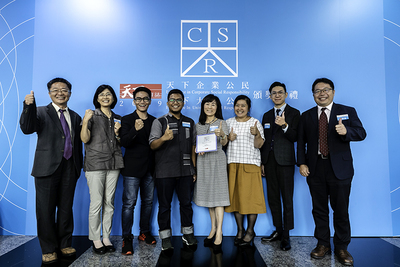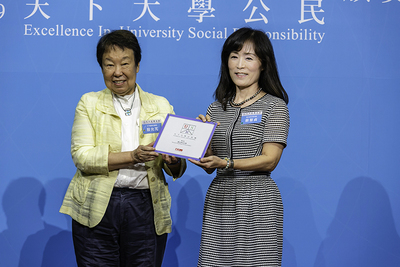

 |
 |
|---|---|
| 大引領USR使命,天下大學公民評選榮登龍頭 | 成功大學在天下大學公民獎榮登國立大學龍頭 |
National Cheng Kung University USR Mission
Ranked in the Top of the CommonWealth University Citizen Rankings
CommonWealth Magazine ran a University Citizen Rankings survey, ranking universities based on university governance, teaching/learning environment, and social engagement. Based on these three major dimensions, the magazine ranked 153 universities for their level of social responsibility. National Cheng Kung University (NCKU) ranked among the top of the list with the best score overall in the national public university category.
The award ceremony for the CommonWealth University Citizen Award was held on September 5, 2019. NCKU president Dr. Huey-Jen Jenny Su received the award on the university’s behalf. In her acceptance speech, Su pointed out that the award highlights the high level of governance at the university while recognizing the value of NCKU’s existence: “Thank you for this award which encourages us to hold steadfast amidst internal and external challenges to the necessity of cultural accumulation. This has helped us become more aware of how to embrace diversity and share truth with the limited resources we have.”
The focus of the University Citizen (USR) Rankings in the category of the university governance focuses on measuring universities’ operational and administrative efficiency as well as their accountability systems. Teaching/learning environment is an aspect emphasizing the interests of all stakeholders, including faculty and students. Social engagement looks at universities’ attention to disadvantaged groups and fairness and justice as well as the influence they exert on industry. National Cheng Kung University, National Taiwan University, National Tsing Hua University, National Chiao Tung University, and National Sun Yat-Sen University were ranked as the top five schools in these categories. NCKU received scores of 5.78 in the category of university governance, 5.71 in social engagement, and 3.33 in teaching/learning environment for an overall score of 4.94, putting NCKU at the top of the list.
Advocating for university social responsibility (USR) has become the global mainstream. Universities in the USA and Canada were among the first to promote USR. Schools in the EU came out with their own USR programs in 2012. The Ministry of Education in Taiwan launched the University Social Responsibility Project in 2017 which included areas that paralleled the UN’s 17 sustainable development goals, such as local community care, industry upgrade, environmental sustainability, and health promotion.
National Cheng Kung University executed three MOE USR projects in 2018 with 50 or so teachers engaging in social engagement. The content of the programs included using innovative ways to create nutritious lunch programs for school children and agriculturally friendly supply chain integration. In addition, the participants collaborated with coastal residents to investigate the potential adverse impacts of climate change and provide solutions. Participants also engaged in the research and development of microorganisms as chemical reagents to deal with crop failures caused by disease and flooding.
NCKU has provided financial support to disadvantaged in their studies abroad. Within two years, the University backed 56 students in their studies abroad, attendance of international conferences, competitions, symposiums, and overseas research. Students traveled to countries in Europe, the USA, East Asia, and Australia.
NCKU has also created a welcoming environment for diversity by creating prayer rooms for its Muslim students. This year during Ramadan, NCKU provided a space big enough to hold 300 people where Tainan’s Muslim students and friends could congregate. This year, NCKU also hosted a summit for Taiwan aboriginal and Austronesian languages as well as an “NCKU Global Muslim Campus Summit”. In addition, the University also established the Center for Vietnamese Studies as well as Center for Hakka Studies.